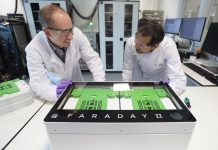
Nissan claims it has batteries representing more than 6GWh on the road via its Leaf vehicles. Now the firm wants to harness that energy in European balancing markets, according to Eduardo Mascarell.
“Nissan is not just talking about electric vehicles (EVs), but energy services,” said the head of vehicle to grid and stationary storage at Nissan Europe. “Because something is happening within Nissan. We are using batteries inside or outside of the vehicle. Batteries with, or without, wheels.”
Speaking at National Grid’s Power Responsive conference, Mascarell promoted the firm’s push to diversify. He said Nissan has some 90 installations across Europe where its cars’ batteries are providing grid-balancing services, primarily frequency response. Also, he admitted, “for marketing purposes”.
But the carmaker sees vehicle to grid (V2G) services as a significant part of its future.
Nissan trials in Denmark, said Mascarell, suggest EV owners can earn €1,300 per year by using car batteries to balance the grid. Vehicles, he suggested, are on average parked for more than 90% of the time.
“We tell them, the more you are parked, the more you earn,” he said.
“We believe that [V2G] is the cheapest solution to balance the grid – and the end user becomes part of the solution,” he said, earning a share of the spoils.
Meanwhile the company says its battery warranties accommodate grid services. This is critical as strict warranty conditions can otherwise be rendered void.
In the UK, Nissan has 10 V2G installations, mostly at Cranfield. Mascarell said while UK storage policy is imperfect, it is workable. By comparison, German regulation stipulates that, “you have to submit a file for each charger – the same file that would be required to register a nuclear power station”.
To fully deliver a smart grid, Mascarell suggested that local grid operators (DNOs) might need the same level of control as National Grid in terms of dispatching balancing units. But he expressed confidence in the current direction of travel.
“The automotive and electricity industries are coming together and working together because of EVs,” he said.
“The link between the car and the grid is extremely useful. The car is not just a car any more. It is a platform providing added value to the end user and to the grid.”
The Energyst will publish a reader survey and market report on DSR and battery storage in September. Help us create a robust snapshot of DSR and storage – take our 5 minute survey here.
Related stories:
Energy storage ‘will wipe out’ battery storage
Greg Clark calls for automakers and energy industry to collaborate on battery storage
Nissan and Eaton to roll out commercial scale battery in 2017
Nissan turns on 4.75MW solar plant, eyes battery storage market
Somerset site to install ‘grid scale’ Tesla battery unit
Battery storage: Positive outlook or does a correction loom?
Tesla: People don’t engage with energy bills, but they will have to
Ofgem: Energy flexibility will become more valuable than energy efficiency
Follow us at @EnergystMedia. For regular bulletins, sign up for the free newsletter.



